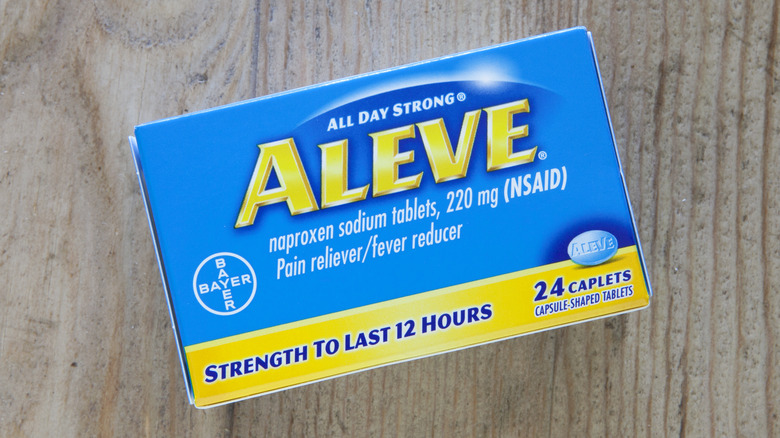When You Take Too Much Aleve, This Is What Happens
Aleve is categorized as a class of medications known as nonsteroidal anti-inflammatory drugs (NSAIDs). Generally, NSAIDs can be easy to take too much of, even if inadvertently done so. Health experts attribute this to the fact that they're widely accessible, sold under various brand names, and people don't always check the labels for dosing information (via Harvard Medical School). In fact, a 2018 study published in Pharmacoepidemiology and Drug Safety found that 37% of participants were taking more than one NSAID brand name at a time. Most participants were unaware they were taking multiple forms of NSAIDs. Those exceeding the daily limit were more commonly men, less likely to start at the lowest dose, and had a "choosing my own dose" mentality. Is taking too much Aleve or other over-the-counter NSAIDs as dangerous as health experts claim, or is it relatively innocuous?
Please note that this article is not intended to replace medical advice or emergency care. If you suspect medication overdose, it's important to seek medical attention immediately.
Side effects of overdosing
It's important to broaden our understanding of the term "overdose." Overdosing on a drug is simply taking any amount over the recommended dosage. While many people tolerate Aleve and other NSAIDs well at their recommended dosage, there's always a risk of side effects when taking any kind of medication. The risk of side effects increases at higher doses and if the drug is taken for a long period of time (via National Health Service).
While side effects, such as headaches and stomach upset, can seem insignificant, other symptoms like internal bleeding and anemia are a cause for greater concern. Perhaps most concerning of all the symptoms, though rare, are liver problems, heart failure, and stroke. To reduce your risk of side effects, always follow the recommended dosage and allotted time frame. You can find the most current dosage limits on Aleve's website.
Those with certain health conditions may experience worse side effects, including stomach bleeding and diseases of the kidney, heart, and liver. If you have any of these health issues, it's important to consult your doctor before taking Aleve or other NSAIDs (via Healthline).


